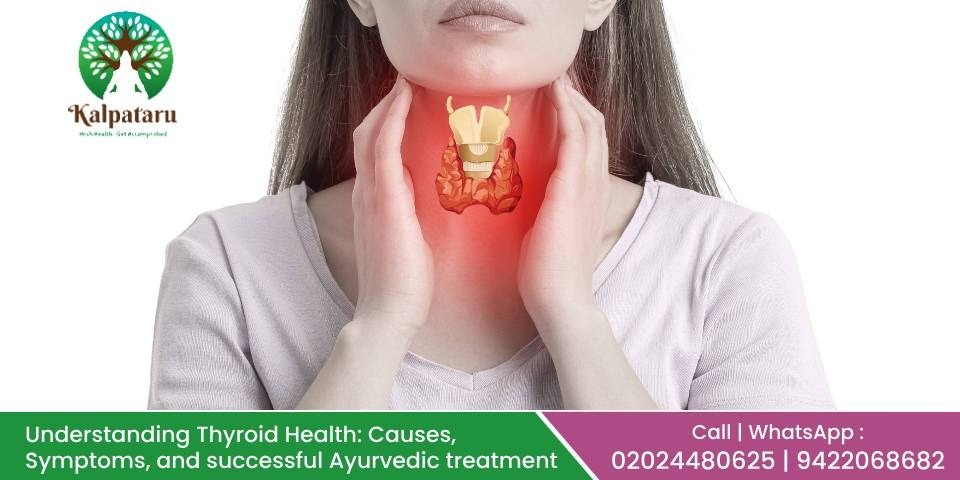The thyroid gland, a small butterfly-shaped organ located in the front of the neck, plays a crucial role in regulating various bodily functions by producing hormones. Thyroid disorders can significantly impact health, with hypothyroidism being one of the most common conditions associated with this gland.
What is the Thyroid Gland?
The thyroid gland produces hormones—thyroxine (T4) and triiodothyronine (T3)—that regulate metabolism, growth, and development. These hormones influence vital functions like heart rate, body temperature, and energy levels.
Hypothyroidism: Underactive Thyroid
Hypothyroidism occurs when the thyroid gland doesn’t produce enough hormones to meet the body’s needs. This condition can arise due to various factors.
Causes of Hypothyroidism:
- Autoimmune Disease (Hashimoto’s Thyroiditis): The most common cause where the immune system attacks the thyroid gland, impairing hormone production.
- Iodine Deficiency: Inadequate iodine intake affects hormone synthesis by the thyroid.
- Thyroid Surgery or Radiation Therapy: Treatment for thyroid cancer or other conditions can lead to reduced hormone production.
- Medications: Certain medications can interfere with thyroid hormone production.
Symptoms of Hypothyroidism:
Recognizing the signs of hypothyroidism is crucial for timely diagnosis and treatment. Common symptoms include:
- Fatigue
- Weight gain
- Cold sensitivity
- Dry skin
- Hair fall, hair thinning
- Constipation
- Depression
- Irritability
- Muscle weakness
- Irregular menstrual cycles. Etc
Complications of Untreated Hypothyroidism:
If left untreated, hypothyroidism can lead to serious health complications, including:
- Goiter: Enlargement of the thyroid gland due to constant stimulation by the pituitary gland.
- Heart Problems: Increased risk of heart disease, including elevated cholesterol levels and heart failure.
- Infertility and Pregnancy Issues: Hypothyroidism can affect fertility and increase the risk of miscarriage or birth defects if not managed during pregnancy.
- Myxedema: A rare but life-threatening condition characterized by extreme symptoms of hypothyroidism, such as decreased body temperature, confusion, and unconsciousness.
Exploring Thyroid Health in Ayurveda:
The concept of thyroid disorders in Ayurveda delves into the intricate balance of bodily elements and doshas (bio-energies) that influence overall health and well-being. As per ayurvedic principles, Thyroid disease can be correlated to “Galgand” vyadhi. According to Ayurvedic principles, imbalances in elements like ras (plasma), rakta (blood), maansa (muscles), meda (fat) dhatus, along with the accumulation of kapha dosha, can contribute to thyroid dysfunction.
Ayurvedic Perspective on Thyroid Disorders:
In Ayurveda, thyroid disorders are seen as a manifestation of underlying imbalances in the body’s constitution. The treatments aim to restore harmony and promote optimal functioning by addressing these imbalances. Research in Ayurveda has explored herbal remedies and therapies that show promise in alleviating thyroid disorders.
Role of Toxins in Thyroid Disorders:
In Ayurveda, when you notice symptoms of thyroid imbalance by paying attention regularly, you may see that there are more toxins in the body because the metabolism is slower. This can lead to different symptoms like changes in weight, hair loss, feeling tired, irregular periods, and constipation.
These symptoms mostly happen because toxins build up in the body. So, it’s important to reduce toxins through medicine and special Ayurvedic treatments like panchakarma to treat thyroid problems effectively.
Herbal Remedies and Therapies:
Ayurvedic treatments often incorporate herbal remedies known for their potential to regulate thyroid function and reduce symptoms. Herbs like guggul, Kanchnar, Punarnava, Ashwagandha, Kunakhi, bhallatak, Varun, shigru, etc. have been studied for their ability to reduce TSH, goiter and thyroid nodules, potentially avoiding the need for surgical intervention.
Lifestyle and Dietary Modifications:
Ayurveda places significant emphasis on daily routines (dinacharya) and dietary habits (ahar) in managing thyroid health. These practices influence the body’s biological clock (circadian rhythms) and metabolism. Mainly eating habits and sleeping time is the most important thing. Adopting specific dietary guidelines and incorporating Ayurvedic practices into daily routines can play a pivotal role in supporting thyroid function.
Therapeutic Practices:
Panchakarma treatments are an important part of healing thyroid disorders from their roots. Procedures like vomiting therapy (Vaman), purgation therapy (Virechana), enema therapy (Basti), nasal therapy (Nasya), and various types of herbal applications are highly beneficial in correcting thyroid imbalances. These treatments can help alleviate issues caused by thyroid medications.
Additionally, incorporating different types of yoga along with exercise can also be very beneficial. Practices like Omkar chanting, Kapalabhati (breathing exercise), and specific yoga poses such as Sarvangasana, Halasana, Shishuasana, Matsyasana, and Dhanurasana help stimulate the thyroid gland to naturally produce necessary hormones.
Early Recognition and Prevention:
Recognizing the symptoms of thyroid disorders early is crucial in Ayurveda to prevent complications such as weight gain, fatigue, hair loss, depression, menstrual irregularities, and constipation. Ayurveda also acknowledges subclinical thyroid disorders, emphasizing the importance of expert advice and tailored treatment to prevent adverse health outcomes, particularly cardiovascular issues.
Summary:
Ayurveda advocates for a holistic approach to thyroid health, combining lifestyle modifications, herbal remedies, and therapeutic practices to restore balance and harmony in the body’s functioning. By addressing the root cause of thyroid imbalances, Ayurveda aims to promote overall well-being and vitality.
If you suspect thyroid dysfunction or are seeking alternative approaches to managing thyroid disorders, consult with a Kalpataru Ayurvediya Chikitsalaya™ qualified Ayurvedic Dr. Manoj Deshpande for personalized guidance and treatment options tailored to your unique constitution and health needs. Embracing Ayurvedic principles can offer a holistic pathway to thyroid wellness, enhancing both physical health and inner vitality.

